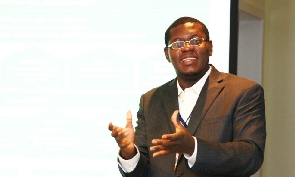The Vice President of Imani Africa, Bright Simons, has cast doubt on the government's assertion that the recently signed lithium deal, offering 10% royalties, is the best agreement in the history of mining in Ghana.
Contrary to the government's claims, Simons argued that historically and factually, the deal does not stand as the best in Ghana's mining history.
Speaking on Accra-based Joy News, Simons raised concerns about the framing of the agreement, emphasising the need to address crucial questions to ensure optimal value extraction from the mineral resource.
“The challenge that we’ve had with this agreement is the way it's been framed as the best agreement we’ve ever had in mining. All of the focus has been in praising the agreement rather than answering some very important questions about how to make sure that we get the best value out of this mineral.
“Given the royalties in the agreement we are supposed to get 10%, this means that whatever money is gotten from the sales of the lithium, the government takes 10% whether there was profit or not.
"Then the other financial obligations that require them to pay some other percentages by way of taxes and 13% stakes in the company set up to mine the mineral.
"All of these have come together to create the picture that has been painted that this is the best deal we’ve ever had. The truth is that historically and factually, that cannot be true. Because in our own history, we’ve had mining agreements where the state owns far more,” he stated.
Explaining further, Bright Simons, pointed out that the state had previously owned a more substantial stake in mining assets, citing examples from the Acheampong regime in the 70s and negotiations with Ashanti Gold in 1969.
“When you go into the 70s, under the Acheampong regime, a mining decree was created and as a consequence of that mining decree, 65% of every mining asset in this country was owned by the government.
"In fact, most of the gold mines were owned by the state, except in the likes of Ashanti Gold. Even though some will say that was a nationalisation period, the truth is that, they were not just entirely just entirely nationalising because they were signing service contracts that made those companies contractors of Ghana.
“Before then in 1969, we had already gone to a negotiation with Ashanti Gold to acquire 20%; this was without the nationalisation and we had an option to buy additional 20%. So, it is not possible that the 13% share is the highest we have ever done in our history, it's just historically possible” he added.
Ghana’s leading digital news platform, GhanaWeb, in conjunction with the Korle-Bu Teaching Hospital, is embarking on an aggressive campaign which is geared towards ensuring that parliament passes comprehensive legislation to guide organ harvesting, organ donation, and organ transplantation in the country.
Click here to follow the GhanaWeb General News WhatsApp channel
NW/
You can also watch the latest episode of Everyday People on GhanaWeb TV below:
General News of Thursday, 14 December 2023
Source: www.ghanaweb.com

















